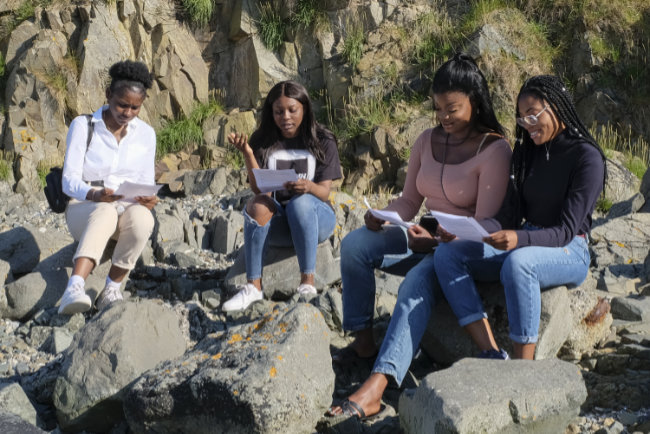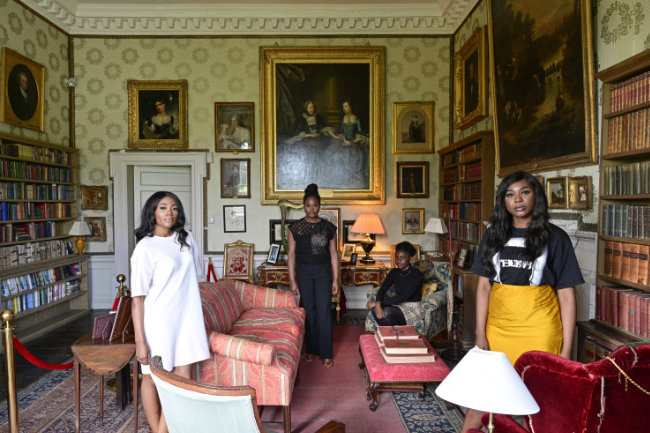
Until 3 December
This Is What We Call Progress is set in the drawing-room of 18th Century Newbridge House, Donabate, a Georgian Villa built to the design of James Gibbs in 1747 for the Archbishop of Dublin, Charles Cobbe.
His great grand-daughter Frances Power Cobbe (1822-1904) who was born in Newbridge House became a writer, social reformer, anti-vivisection activist, and a leading women’s suffrage campaigner.
In this film a group of young women Benedit Akemba, Drucille Akemba, Gabriella Ogwude and Ihuaku Igbosonu who collectively call themselves My Sisters Keeper assert their agency surrounded by oil paintings of colonial masters.
The film explores ideas of how cultural identities are formed and represented in the public realm and the concerns expressed by young multi-ethnic youth growing up in a time of rapid change in Ireland and internationally.

Production meeting for This is what we call progress (2021) © Anthony Haughey
This film by Anthony Haughey is part of a trilogy of short films called Assemble which reflect on the impact of global migration from the point of view of young people living in Balbriggan, it was commissioned by Fingal County Council Infrastructure Public Art Programme 2017-2021 and produced in collaboration with the Global Migration Collective.
The research for the films refer to historical antecedents from Civil Rights in the 1960s to the Black Lives Matter movement in 2020.
Within this socially engaged production, young people collaborated and negotiated every aspect of filmmaking from scripting to film treatment and choice of location. At the end of this process, the same young people assumed the role of non-professional actors as they claim agency and ownership of the narrative.

Production image, This is what we call progress (2021) © Anthony Haughey
Anthony Haughey is a socially engaged artist, photographer, filmmaker, and educator. His artworks have been widely exhibited and collected nationally and internationally.
The Global Migration Collective was founded in 2005 by Lauretta Igbosonu, Warsame Ali Garare and Anthony Haughey. It is an ongoing collaboration with migrants from all over the world, many arrived in Ireland as asylum seekers from 1999 onwards.
In response, Ireland’s government set up Direct Provision Centre’s where asylum seekers are held indefinitely during the process of negotiating citizenship. Asylum claims are supposed to be processed in a timely manner, however, many families have lived in Direct Provision for more than ten-years.
The Global Migration Collective have collaborated to produce public art interventions, video installations, photographs, texts, performances, and public talks, in Ireland, Europe and North Africa. These transformative actions set out to dispel myths and reductive stereotyping surrounding transnational migration.
Emmett Place, Cork, Ireland
T12 TNE6
Tel: 021 480 5042
info@crawfordartgallery.ie
Opening Hours
N.B. Last entry is 15 minutes before closing
Monday–Saturday 10.00am–5.00pm*
Thursday until 8.00pm
Sundays and Bank Holidays
11.00 am–4.00pm
© 2024 www.crawfordartgallery.ie